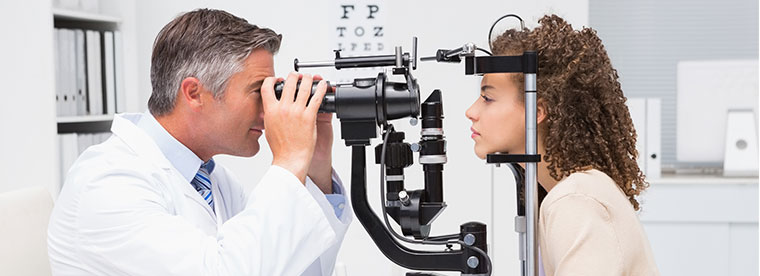Some of these conditions may require care from an oculoplastic surgeon like me.
Seeing overall health conditions in the eyes
The information an eye doctor gathers during an eye exam isn’t limited to the state of your vision or even conditions that just affect your eyes. The eye and the eye socket are composed of many different types of tissues. Nerve tissue from the optic nerve sends information directly to the brain. The eye socket contains blood vessels and fatty tissue. The whites of the eyes and the tear ducts have mucous membranes that protect the eyes and keep them from becoming dehydrated.
All these different tissues mean the eyes can play a role in many conditions that affect the head or the entire body. An eye exam is a way for doctors to examine blood vessels, nerves and connective tissues, which are difficult to see externally on the rest of the body.
This means we can see indicators of diseases that are affecting specific tissues, sometimes even before a patient notices symptoms. For example, a bulging eye can be a sign of a thyroid disorder, or a drooping eyelid may be a sign of a condition called myasthenia gravis, an autoimmune disease that causes muscle weakness.
Just a few of the conditions that may be reflected in the eyes include:
Keeping an eye on eye health
Regular eye exams are an important step in being proactive about eye diseases and other medical conditions. Most adults should have their eyes examined every year or two. A dilated eye exam, which uses special eye drops to enlarge the pupils, gives us a better view of the inside of the eyes.
Some symptoms shouldn’t wait until your next regularly scheduled exam. If you notice any of these symptoms, call your eye doctor right away:
- Double vision
- Eye pain
- Flashes of light
- New floaters, or tiny specks in your vision, especially if you see many new floaters or much more than usual
- Sudden loss of vision or vision that’s suddenly blurry
- Swelling or redness of the eye or eyelid
You can reduce your risk for certain eye conditions by following healthy habits you may be doing already. The Centers for Disease Control and Prevention’s Vision Health Initiative includes these tips to help keep your eyes healthy:
- Eat plenty of fruits and vegetables, especially dark leafy greens
- If you smoke or use tobacco, stop
- Maintain a healthy weight
- Tell your eye doctor about any eye conditions that have affected your family members
- Wear sunglasses that block ultraviolet radiation, including UV-A and UV-B rays, when you’re outside in the sun
Request an appointment with one of our ophthalmologists if you need an eye exam or if you notice any troubling eye symptoms.
Request an Appointment

